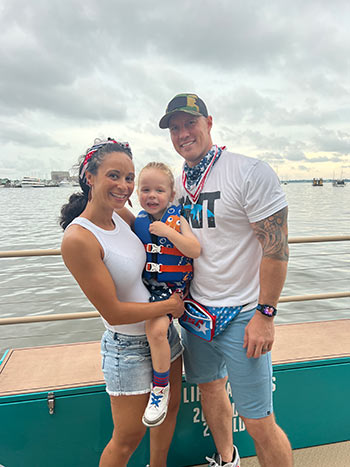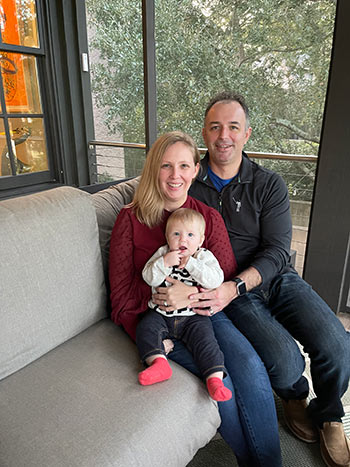
According to the Centers for Disease Control, 19% of heterosexual American women aged 15 to 49 cannot get pregnant after one year of trying. .Per the Cleveland Clinic, approximately 10% of men in the United States suffer from infertility. However, families across the country are not letting these numbers stop them. Thanks to science constantly evolving, infertility now comes with various treatment options and, often, a favorable outcome.
While the exact causes of infertility are not always understood, they often include hormone disruption or medical conditions. No matter the cause, the process of testing for infertility and undergoing treatments is physically and emotionally trying for those that embark on such a journey.

With a family history of infertility, Carter knew she could possibly need intervention. However, she was reluctant to subject herself to hormone and fertility treatments, citing her disdain for needles as the primary deterrent. She briefly considered in-vitro fertilization (IVF) at this point. However, when Carter was referred for initial fertility workups, tests were normal. They stayed the course and, before long, were pregnant without intervention again. Their son, Colton, was born in October 2018, and they were elated.
Carter and her husband wanted to wait until Colton was older before they started trying once again. In the meantime, Carter found her way into functional medicine and started taking a holistic approach to her fertility. She focused on gut health, stress reduction and diet in the hopes of better preparing her body. Yet, Carter once again found herself frustrated by her inability to get pregnant.
The couple considered various options for becoming parents again. They investigated the snowflake program, in which couples adopt embryos. In learning more, however, Carter decided that she would consider IVF before going that route.
This past summer, Carter underwent IVF under the care of Dr. Cox at Adore Fertility in Mount Pleasant. She briefly went back on birth control to help regulate her menstrual cycle and then began self-administering hormone injections to increase follicle production. Meanwhile, her husband underwent testing and used functional medicine to optimize his fertility.
After two rounds of IVF, Carter was not able to get pregnant. She recalls being devastated but trying to stay positive. Carter has been sharing her journey with infertility on social media to open and normalize conversation on the topic. As a physician, she tends to be pragmatic about the complex feelings surrounding medical treatments but recognizes the profound need for vulnerable discussion.
The family has now decided to pursue adoption in the hopes that Colton will one day become a big brother. They looked into fostering before Colton’s arrival, so they were familiar with the process to some degree. While their journey with infertility was difficult and at times utterly disappointing, Carter is grateful and excited to grow her family. She’s thankful she has the means and the freedom to choose her path.

Because of the findings, Owens chose to start IVF quickly. She remembers the “horrible yet wonderful” days of 40 or more hormone shots in preparation for retrieval. At age 32, the hormones aimed to stimulate Owens’ follicle production. The retrieval resulted in a whopping 46 follicles, which is very unusual. Genetic testing, however, reduced the number of viable follicles to 32. Each follicle was then fertilized and observed for five days. Viability waned until the couple had three embryos to consider for implantation.
Transfers today are most often done one at a time and based on doctors’ recommendations. The goal is to select the strongest embryo and support implantation and pregnancy with hormones. Owens’ son Alexander was born of the very first embryo in March 2021.
Owens’ other two embryos were frozen. The second transfer was done in May of this year and was also successful the first try. Owens is currently in her second trimester of pregnancy. She is due to have a baby girl in February 2023. The family has not yet decided what their plans are for the remaining embryo.
Unfortunately, there is no safety net for the roller coaster ride of emotions that couples and individuals facing infertility must navigate to make their parenting dreams come true. Both Carter and Owens recall the frustration of the unknown, the physical discomfort of the treatment and the fear of failure. Every family’s journey with infertility is different and can be challenging in unique ways. However, keeping the eye on the prize — the child or children they see at the end of that long road — makes it worthwhile.
Whether through successful fertility interventions, fostering or adoption, those facing infertility remain motivated by profound love, infinite hope and a simple wish that each intervention will get them closer to their bundle of joy. In the end, however their child ends up in their arms, they know they’ve been given the greatest gift of all.
By Isabel Alvarez Arata